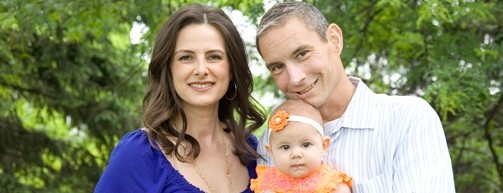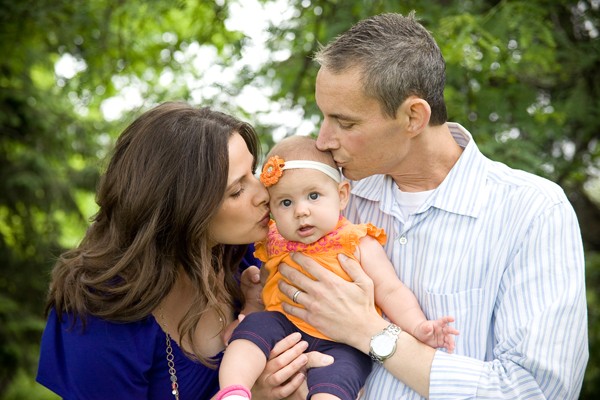
Helping research get off the ground
Gromada Foundation supports UC researchers in personal bid to end head and neck cancer

Brandon Gromada with wife Christina Gromada and daughter Morgan.
Nearly 10 years after a personal loss from a head and neck cancer, the Brandon C. Gromada Head & Neck Cancer Foundation continues to advance research around the devastating disease at the University of Cincinnati Cancer Center.
“We don’t want others to endure what our family has,” explains Karen Gromada, chair of the Gromada Foundation.
In March 2010, Dr. Joseph and Karen Gromada’s oldest son, Brandon, was diagnosed with a squamous cell carcinoma after a surgery to remove nasal polyps in his sinus. The cancer would prove aggressive. Despite the best care efforts, Brandon passed on June 2, 2012. The Gromada Foundation launched the very next day.
With Brandon’s family at the helm — including his parents, siblings, wife and daughter — the Gromada Foundation now fights for a future where effective cures are readily available for head and neck cancers with mild to no side effects.
At the cancer center, the foundation is supporting efforts by some of the very physicians who helped to care for Brandon through the Brandon C. Gromada Head and Neck Cancer Research Pilot Grant, funding several innovative research projects. As head and neck cancer is the sixth most common cancer worldwide, such work is critical.
The research
“Our ultimate vision is to end head and neck cancer,” Karen says. “Research is the only way to do that.”
The Gromada Foundation focuses on supporting innovative projects that need initial funding to get off the ground. This allows researchers to collect preliminary data needed for subsequent grant applications, explains Vinita Takiar, MD, PhD, vice chair of research with the radiation oncology department at the UC College of Medicine.
“Our lab focuses on ways to improve treatments and outcomes,” Takiar says. “We are very translational and seek to learn from our patients as to why they may have responded (or not) to treatment. From there, we work to develop new treatments or understand reasons why the tumor may have been resistant to treatment.”
The approach has been effective. One cancer center project, centered on using human tumor tissue to grow the tumor in a petri dish, launched thanks to an initial $25,000 investment from the Gromada Foundation, and then gained subsequent funding from the American Cancer Society.
“From this research, we identified new pathways for future treatment and undertook new investigations. The data allowed us to submit for a larger grant so we could focus on activation of Natural Killer cells that may be important for immunotherapy-based treatment,” says Trisha Wise-Draper, MD, PhD, medical director of the UC Cancer Center Clinical Trials Office. Wise-Draper helped to care for Brandon during his fight.
The family has been struck by a lot of adversity and are aware of the devastation that can occur with this type of cancer. They both are trying to help create better outcomes for future patients.
Trisha Wise-Draper, MD, PhD medical director, UC Cancer Center Clinical Trials Office
Community support
The Gromada Foundation chooses to support UC research not only because it is where Brandon received such compassionate care, but also because of the cancer center’s consistently strong research proposals. The UC Cancer Center and UC College of Medicine’s projects routinely made the top list of proposals reviewed by outside experts in a blinded review process.
“This inspired our board’s confidence in the research and work being done at the UC Cancer Center,” Karen explains.
She adds that staying local was important to the family during his care.
“For Brandon, a big thing was being able to stay close to home for his treatment,” Karen says. “When you’re sick like that, you shouldn’t have to drive far for excellent treatment. It’s the last time you want to be far from home.”
In November 2021, Dr. Joseph Gromada, Karen’s husband, was diagnosed with another type of head and neck cancer. They have entrusted his care to the cancer center.
“The family has been struck by a lot of adversity and are aware of the devastation that can occur with this type of cancer. They both are trying to help create better outcomes for future patients,” Wise-Draper said.
Since its founding, the Gromada Foundation has contributed an impressive $325,000 to head and neck cancer research.
For more information on the Gromada Foundation and their upcoming events, visit gromadacancerfndn.org.
Feature image at top: Christina, Morgan and Brandon Gromada. Photo/Provided.
Who will you empower NEXT?
As the thriving research nexus of our region, the University of Cincinnati is solving problems with unrivaled talent who push the boundaries of discovery and innovation for the greater good. Your investment in Next, Now: The Campaign for Cincinnati can launch UC research and innovation to the next frontiers that await us. Learn more at nextnow.uc.edu.
Related Stories
Doctors prepare for surgeries with 3D-printed organs
April 11, 2025
Meteora3D, a Venture Lab-backed startup, helps surgeons better understand upcoming procedures by designing and developing quick-to-produce, 3D-printed anatomical models.
A 'night on the Serengeti' — in Cincinnati
Event: April 12, 2025 6:30 PM
University of Cincinnati and Village Life Outreach Project celebrate two decades of service to communities in rural Tanzania. The milestone will be honored on April 12 with a vibrant fundraiser titled “Village Life: Night on the Serengeti,” hosted at Cincinnati’s contemporary 21c Museum Hotel. The evening promises Tanzanian cuisine, art, live performance and, most importantly, a renewed call to sustain a mission that has transformed lives across continents.
Student Body Vice President grateful for scholarship
April 9, 2025
For many college students, financial barriers often dictate their paths, limiting opportunities, shifting career goals, and reducing involvement on campus. But for Khalid Davis, Bus ’25, scholarships changed everything, turning aspirations into reality and opening doors he could never have imagined.